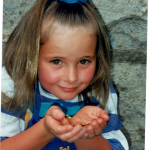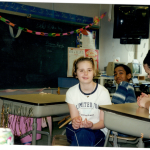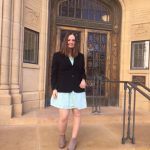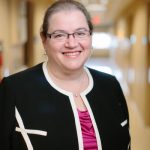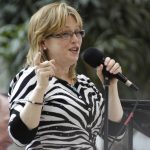‘It can be done:’ Mayo Clinic School of Medicine evolves, accommodating a student’s disabilities
When Leah Grengs Thompson, M.D. (MED ’17), was 6 years old, the Americans with Disabilities Act (ADA) became law. The ADA prohibits discrimination against individuals with disabilities in all areas of public life including jobs, schools, transportation.
When Dr. Thompson was 11, she had a hemorrhagic stroke due to a benign brain tumor. Despite surgery, rehabilitation and years of therapy, she has permanent deficits including left-sided leg and arm weakness and significant vision loss.
Thanks to the ADA, she was accommodated through the years of her education but accepted that she was unable to do some things — play sports and drive, for example. She says she found her niche while volunteering at a Twin Cities hospital, near where she grew up.
“I hadn’t felt like I could do anything particularly well,” she says. “That changed when I started at the hospital. I loved working with patients and their families.
“I always assumed I wasn’t smart enough to be a doctor. My parents hadn’t gone to college, and I didn’t personally know anyone in medicine. When I started college and studied biology, I realized I was smart enough and became determined to go to medical school.”
A thriving undergrad
Dr. Thompson thrived at the University of Minnesota — inside and outside of the classroom —and earned bachelor’s degrees in neuroscience and anthropology and graduated summa cum laude. She received numerous scholarships:
- Pediatric Brain Tumor Scholarship
- Children’s Hospitals and Clinics of Minnesota Volunteer Services Scholarship
- College of Biological Sciences Volunteer Award
- University of Minnesota Access Abroad Scholarship
- University of Minnesota Learning Abroad Center Scholarship
- University of Minnesota Women’s Club Stephanie R. Boddy Scholarship
- University of Minnesota Women’s Club Doris Doeden Scholarship
- J.A. Wedum Foundation Scholarship
- University of Minnesota President’s Student Leadership and Service Award
She traveled to Bolivia to assist in establishing clinics in impoverished rural communities and tutored at a homeless shelter in Minneapolis.
Dr. Thompson took the MCAT three times. “In college, I’d always sought accommodations and gotten extra time for exams due to my vision problems,” she says. “I was stubborn and didn’t ask for accommodations in taking the MCAT. I studied hard yet did poorly. I had trouble reading the passages. After I applied for accommodations, I did very well.”
Despite her successes, Dr. Thompson says she was so worried she wouldn’t get accepted to medical school due to her disabilities that she applied to 40 schools, using up all of her savings.
“I read the technical standards of the schools I applied to. They were difficult to interpret and understand,” she says. “I let all of the schools I interviewed at know about my physical limitations in advance. At a few schools, including Mayo, I met with a specialist to discuss my situation. This told me they took it seriously and would likely work to accommodate me.
“Mayo was where I really wanted to go. I jumped up and down when I was accepted.”
A self-accepting med school student
Dr. Thompson says she was shy at first with her medical school classmates. “I didn’t want to appear to need extra help or extra time for exams,” she says. “At Mayo Clinic, I learned to be more open and accepting of myself. Sometimes I can’t believe how lucky I am to have been able to go to medical school and do exactly what I want to do.”
To be able to do exactly what she wanted, though, is part of the spirit of the ADA.
A place of public accommodation
“Education is a place of public accommodation because we believe everyone has a right to be educated,” says Robin Molella, M.D. (MED ’90, I ’97, PREV ’99), director of Health, Disability & Accommodations for Mayo Clinic School of Medicine and a consultant in the Division of Preventive, Occupational and Aerospace Medicine at Mayo Clinic in Rochester. “The ADA started learning institutions down this path almost 30 years ago.”
Dr. Molella says Mayo Clinic School of Medicine has a history of accommodating individuals and, compared to other medical training institutions, “We’re quite far in this journey,” she says. “However, it’s not far enough. There’s pervasive ableism in medicine. And there’s a new desire to think about whether or not we’re doing everything we can to make our physician workforce as diverse as possible. Are we opening the doors of medical schools to more and more highly competent people who would be fabulous physicians?”
According to a recent New York Times story, more than 20 percent of the American population has a disability but as few as 2 percent of practicing physicians do. Most of those physicians acquired their disabilities after completing their medical training. Additionally, few people with disabilities are admitted to medical school, and those who are have higher attrition rates than nondisabled students. Why? Because they don’t always receive the support they need despite the ADA. Further, only one-third of medical schools explicitly state their support of accommodations for disabilities on their websites.
Every medical school determines its own technical standards, the cognitive and physical abilities required for admission. Mayo Clinic College of Medicine and Science has a robust Accommodation for Disabilities policy, which states that it will make reasonable effort to accommodate students, residents, fellows and postgraduates with disabilities as defined in Section 504 of the Rehabilitation Act of 1973 and the Americans with Disabilities Act of 1990. Any student with a physical, psychiatric, sensory or learning disability may request reasonable accommodations after providing adequate documentation from appropriate licensed professionals to the Mayo Clinic College of Medicine.
“What do providers really need to be able to do?” asks Dr. Molella. “We must continuously ask what learners need to accomplish in medical school to define them as a physician. Not every physician needs the dexterity of a surgeon. If you plan to become an adult neurologist, must you catch babies in OB rotation? Are you disqualified if you can’t hold retractors for hours in surgery? How much of the shared training legacy in medical education is really necessary? We need to challenge our assumptions and better accommodate completely competent individuals with technology, for example, to ensure a diverse workforce.”
Working step by step, technical standard by technical standard to accommodate
Dr. Molella says Mayo Clinic School of Medicine was fully aware of Dr. Thompson’s limitations when she was admitted. “But we weren’t sure how we’d make it work,” she admits.
Alexandra Wolanskyj-Spinner, M.D., (I ’95, HEMO ’98), senior associate dean for student affairs for Mayo Clinic School of Medicine since 2013 and a consultant in the Division of Hematology at Mayo Clinic in Rochester, had not yet encountered a student with physical challenges quite like Dr. Thompson’s when she entered the medical school.
“I saw this extremely bright, talented person pursuing medicine for the right reasons,” says Dr. Wolanskyj-Spinner. “How could we best help her to succeed?”
Dr. Wolanskyj-Spinner arranged for Dr. Thompson to meet with two Mayo physicians who have physical challenges to discuss how they have succeeded. She also arranged for the new medical student to meet with the student health and disabilities accommodations officer, Dr. Molella.
“Step by step, technical standard by technical standard, they came up with creative ways to help Leah succeed,” says Dr. Wolanskyj-Spinner, a consultant in the Division of Hematology.
She says, increasingly, students with disabilities will be applying for medical school. “They’ve been accommodated through higher education because of the ADA, and they want the same opportunities as anyone else. They’ll be our colleagues. This presents an opportunity for greater understanding and a shift in our education and culture. Mayo Clinic always spearheads the noblest of intentions.”
An evolving medical school
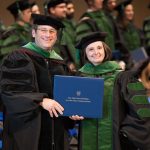
Leah Grengs Thompson, M.D., at graduation with Fredric Meyer, M.D., executive dean for education, Mayo Clinic College of Medicine and Science
Dr. Thompson’s medical school journey wasn’t without bumps. A resident judged her harshly as a result of her physical limitation in an evaluation, using language that Dr. Wolanskyj-Spinner describes as judgmental and insensitive. “I asked the clerkship director to look at the evaluation and determine if it had unfairly affected Leah’s grade. He agreed it was inappropriate and changed the grade to reflect her overall performance. Situations like that provide us with opportunities to learn and better educate all of our learners and faculty members. Leah helped us look at ourselves and our practices, and we evolved and became more open minded. She took us to a place of greater possibilities and acceptance. We developed and standardized new processes and can better serve our diverse students in this regard, which is a priority for our school.”
According to Dr. Wolanskyj-Spinner, Dr. Thompson’s effect on how the school approaches disabilities is only a small part of her legacy. “Leah was integral to many initiatives to improve the quality of life for our students. She played important leadership and advocacy roles including serving on the Student Life and Wellness Committee and the Student Support Advisory Board, and spearheading our student lounge remodeling and My Story program. She enriched our school, her peers and my life. She’s an incredibly compassionate, empathetic person, which is extremely important in medicine, and I am proud to call her my colleague.
“I’m excited to watch Leah as she continues to knock down barriers and break glass ceilings. She will be a leader in her field. She left a permanent legacy at our school.”
A future without heroic effort
Dr. Molella points out that the medical school will have succeeded when students such as Dr. Thompson don’t have to be more courageous or heroic than any other medical student to succeed in medical education.
“Leah overcame incredible adversity to accomplish what she did. It really shouldn’t take that,” says Dr. Molella. “We have to make it easier to achieve this success without double or triple the effort anyone else has to put forth. That will happen when we continuously value diversity and make accommodations. What we gain in the end is so precious and valuable. Not a single person in Leah’s class will look at a person with a disability the way they would have without her in their class. Many vulnerable patient populations will be grateful to have physicians who better understand them and the challenges they face.
“Leah’s story is a success because of her. She had the stamina, willingness and desire to make it work despite the hurdles. Her success shows us it can be done.”
Dr. Thompson’s new chapter
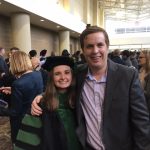
Leah Grengs Thompson, M.D., with her husband, Daniel, at her graduation from Mayo Clinic School of Medicine
Today Leah (Grengs) Thompson, M.D., is a resident in psychiatry at the University of North Dakota in Fargo. She’s also recently married and gotten a rescue dog, Murphy.
A highlight of her medical school experience was serving on the Student Wellness Committee.
“I considered myself a mentor to students in the classes below me,” she says. “I tried to help those who asked for help. I learned so much from my classmates and physicians I worked with.”
Dr. Thompson helped to start the monthly My Story program in which students and staff members share struggles they’ve faced — losing a loved one at a critical time, struggling with addiction or suicidal thoughts, having a physical disability, failing an exam. According to Amit Sood, M.D. (ADGM 05, CLRSH ’06), chair of the Mayo Mind Body Initiative and a consultant in the Division of General Internal Medicine at Mayo Clinic in Rochester, My Story highlights stories in which people have found a resilient pathway through life’s narrow lanes.
“Students love the My Story program,” says Dr. Sood. “Leah took on this project, which we’re expanding to all three Mayo campuses for all 4,000 learners.”
Dr. Thompson says she was surprised to learn that physicians who seemed to “have it all together” have gone through challenges similar to everyone else’s. “I had no idea of the things others had been through. Just because you’re a department head or well published doesn’t mean you’re immune to feeling completely alone. It helps to know others have had similar obstacles.
“I loved being a student at Mayo and gave everything I could to help others.”
After helping fellow students, Dr. Thompson found herself in need of help at the end of 2016. A brain scan showed some abnormal growth in the area of her childhood tumor. She had gamma knife surgery in January during the time she was interviewing for residency. She says Dr. Wolanskyj-Spinner acted as a surrogate parent to her during that time, helping her figure out her treatment options and how to navigate her residency interviews.
“After helping so many other students, it was crazy that I ended up needing help myself,” she says. “In the past, I’d have been shy about opening up. But I’d learned how to do that and called Dr. Wolanskyj-Spinner right away and asked for her help. She was wonderful.”
A recent scan showed the tumor is stable although lifelong monitoring is required.
Mayo Clinic named among Best Places to Work on Disability Quality Index
For the second consecutive year, Mayo Clinic had a top score on the Disability Equality Index, earning a spot on the 2017 Disability Index Best Places to Work list. Mayo Clinic was 1 of 67 companies that scored the maximum 100 on the Disability Equality Index.
The U.S. Business Leadership Network and American Association of People with Disabilities conduct the ranking, which scores companies based on culture and leadership, enterprisewide access, employment practices, community engagement and support services.
